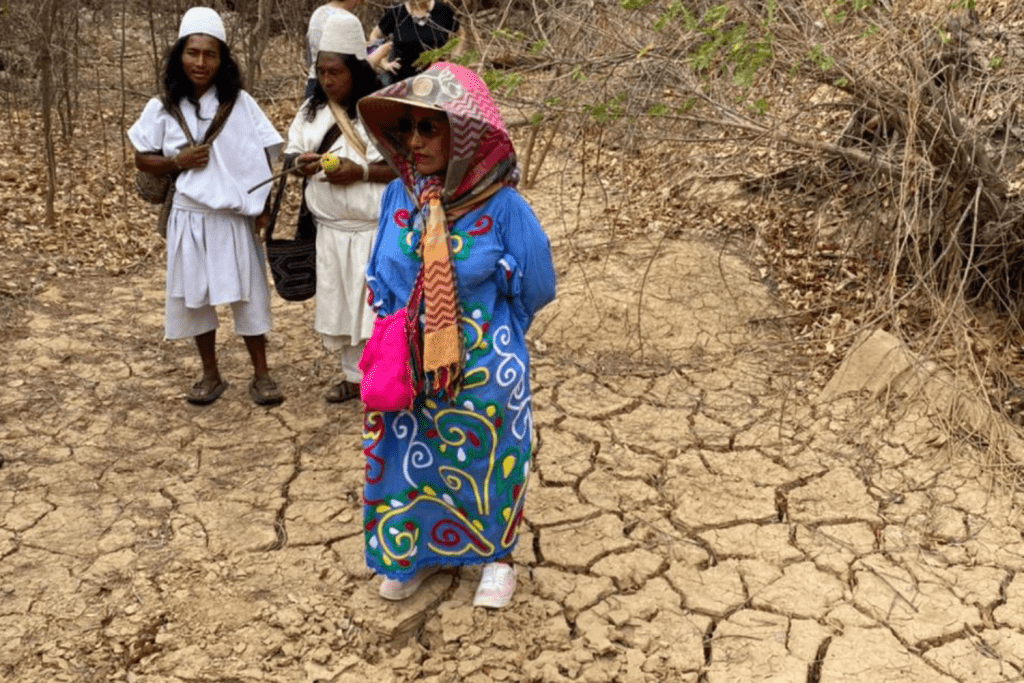Indigenous communities in Colombia are are reporting a devastation of their land, water and sacred spaces as a result of coal mining by British-registered multinational Glencore PLC.
Ask your MP to sign EDM 136 more information here
Glencore PLC is the sole owner of the Cerrejón mine, La Guajira, Colombia, which is one of the largest open pit coal mines in the world, covering approx. 69,000 hectares. The persistent expansion of the mine over the past four decades has led to ruinous environmental degradation and serious human rights impacts. The air in La Guajira contains particulate matter, in excess of the limits recommended by the WHO and the limits imposed on Cerrejón by the Colombian courts.
Annually there are over 400 emergency room visits and over 336,000 respiratory symptom cases directly attributable to the mine.[i] Studies have shown that air pollution is driving elevated levels of cellular damage, in turn raising the risk of cancer, DNA damage, and chromosomal instability for those living in the region.[ii]
In 2020, Cerrejón’s activities were denounced by seven UN Special Rapporteurs. David Boyd stated[iii]
As well as contaminating the air, the mine consumes and contaminates significant quantities of water, using approx. 24 million litres of water per day. In 2019, it dumped 578 million litres of liquid waste into natural bodies of water. Studies on the Ranchería River have found unsafe levels of harmful metals in the water, including mercury and lead. Cerrejón’s diversion, consumption, and contamination of water has led to water scarcity, food scarcity, and health impacts for those who live in La Guajira.[iv]
These harms have been expedited because of the mine’s various structural interventions into the hydrological system in Guajira. The Ranchería River is the principal waterway in the region, and many communities once relied upon it for their domestic and farming activities. The river’s flow was previously fed by 23 main tributaries, many of which have now been destroyed or diverted. The recent diversion of a tributary, called the Arroyo Bruno, was carried out despite a court judgment finding that the diversion could violate fundamental rights.
The Arroyo Bruno supports the ecosystem of a tropical dry forest, which is in critical danger of extinction globally.

Guajira is the ancestral land of the Wayúu indigenous people and many Wayúu communities have been displaced to make way for the mine. Afro-Colombian and campesino communities (subsistence farmers) in the region have faced similar displacement. At times, evictions have been carried out with armed guards, tear gas, and metal projectiles.[v] In 2016, bulldozers were used to destroy an Afro-Colombian village. Even when Cerrejón claims to have consulted with displaced communities, it has not enabled a genuinely free choice as to relocation, as consultation is premised on the assumption that expansion will continue.
In a recent judgment, Colombia’s Constitutional Court stated that[vi]
the mine’s impacts arise within ‘a general context characterised by indigenous communities that present a high degree of vulnerability, and large-scale mining exploitation puts their environment and health at risk’.
In 2034, Cerrejon’s licence will run out and a just transition is essential for communities and mine workers. Following considerable pressure from communities, NGOs and international organisations and questions from MPs and TDs[vii], the company recently published its mine closure plan. The plan primarily addresses biotic and physicochemical aspects, but completely neglects the significant social impacts on the Wayuu and Afro-descendant communities, particularly concerning air, water, and soil pollution and long-term environmental impacts, including acid water drainage and landscape changes. The company also fails to include any unresolved damages, meaning that the state may ultimately have to bear the responsibility for addressing these. Communities affected by the Cerrejón mine cannot be left to pick up the pieces of a devastated environment. Accountability for the cumulative and ongoing impacts of the mining operations, a just mine closure and proper reparations are essential.
Glencore claims adherence to international conventions and position itself as a “leader” in the so-called green energy transition, but its on-the-ground actions tell a starkly different story. As the world’s largest commodity trader, Glencore’s carbon footprint speaks for itself. Investors in the last AGM questioned Glencore’s over its climate impact.
Stand with indigenous communities in Colombia and Perú in their struggle to protect the environment, their homes and their rights.
Let’s challenge corporate impunity, advocate for genuine trade justice for both people and planet, expose greenwashing, and seek reparations for affected communities.
Get your MP to sign EDM 136 for information on how to do this go to this page
[i] OECD Complaint https://www.abcolombia.org.uk/wp-content/uploads/2022/01/Parent-Companies-FINAL.pdf
[ii] OECD Complaint https://www.abcolombia.org.uk/wp-content/uploads/2022/01/Parent-Companies-FINAL.pdf
[iii]ABColombia, ‘Digging Deeper: UN Special Rapporteur David Boyd’s video statement – El Cerrejón and the need for TNC Treaty’ at 1:30. https://www.youtube.com/watch?v=ffWTT9Q69g8
[iv] OECD Complaint https://www.abcolombia.org.uk/wp-content/uploads/2022/01/Parent-Companies-FINAL.pdf
[v] OECD Complaint https://www.abcolombia.org.uk/wp-content/uploads/2022/01/Parent-Companies-FINAL.pdf
[vi] Colombian Constitutional Court, T-614 of 2019 para 9.10.
[vii] UK MPs and Irish TD’s questioned Cerrejón in La Guajira on an ABColombia Delegation to Colombia in April 2022.
